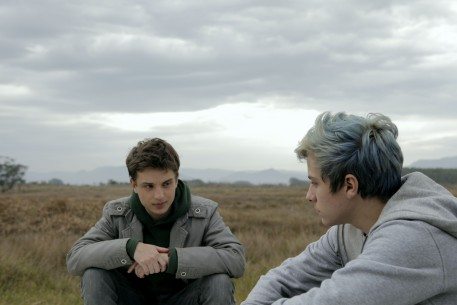Berlinale 2015: Seashore
Directors: Filipe Matzembacher, Marcio Reolon
Cast: Mateus Almada, Maurício José Barcellos, Elisa Brites
Length: 83 minutes
Country: Brazil
I have to give Beira-Mar (Seashore) some credit. Although it has many flaws, the first twenty minutes didn’t give me any indication of how it would end. I assumed it would be one kind of movie – something violent about misguided youths – but instead it turns into something much sweeter indeed. Attendant cinephiles may see what’s coming. There’s a strong intertextual reference to a recent landmark film around half-way through that kind of gives it away. Its so obvious it has to be homage, given the differing personality of the two boys. In short, the first half was bad, with aimless dialogue and queasy cinematography, but it really picks up in gear and nails it by the end. The film is a turbulent, meandering plane ride, but somehow manages to really stick the landing.
The plot at times is like a standalone episode of Skins, in its portrayal of youth as full of underage drinking, house parties and sex, but also in its try-hard leaps towards profundity. Martin’s (Mateus Almada) father has a job for his son, to drive over to their beach house and retrieve an envelope from their estranged family. It’s suggested that his father is a criminal of some sort, but like many things in Beira-Mar, it is shrouded in unnecessary mystery. He takes along his best friend Tomaz (Maurício José Barcellos) and they share the usual best friends dynamic; one better at talking to girls and having fun, the other more introverted and artistic, sketching in his book. There is one telling scene where guy gets into a club whilst Tomaz is too shy to challenge the bouncer. The beachhouse setting provides a liberal space for contemplation and experimentation, away from the watchful eye of authority. Among guys attempts to retrieve the mysterious envelope, and brooding about his father issues and fear of the sea, the boys have a house party where they invite over some girls.
Sadly, the directors wanted to have a MacGuffin for the boys being there in the first place – instead of, I don’t know, taking a holiday – shoehorning in a wannabe Antonioni style-thriller whilst a coming-of-age story would have sufficed.
The nuanced way in which sexuality is handled here, plus some exciting dancing scenes gave me a glimpse of the kind of film this could have been. Sadly, the directors wanted to have a MacGuffin for the boys being there in the first place – instead of, I don’t know, taking a holiday – shoehorning in a wannabe Antonioni style-thriller whilst a coming-of-age story would have sufficed.
The ending is done so well it’s a shame the first two acts couldn’t support it. For such a short film it attempts to pack in too many unresolved storylines, and lingers in ambiguity when a clearer approach would have worked better. The director obviously has a lot of things to say about sexuality, friendship and patriarchal influence, but Beira-Mar is overstuffed and needlessly complex. The filmmakers try to fit a novel into a short story when the short story was more than enough. I saw a few people walk out before the final act, and they missed out, as the final act makes up for the misguided first half. Even though it wasn’t a very good film, I applaud its bravery and ambition, and hope to see more films from Filipe Matzembacher and Marcio Reolon in the future.
Image source: berlinale.de


Comments